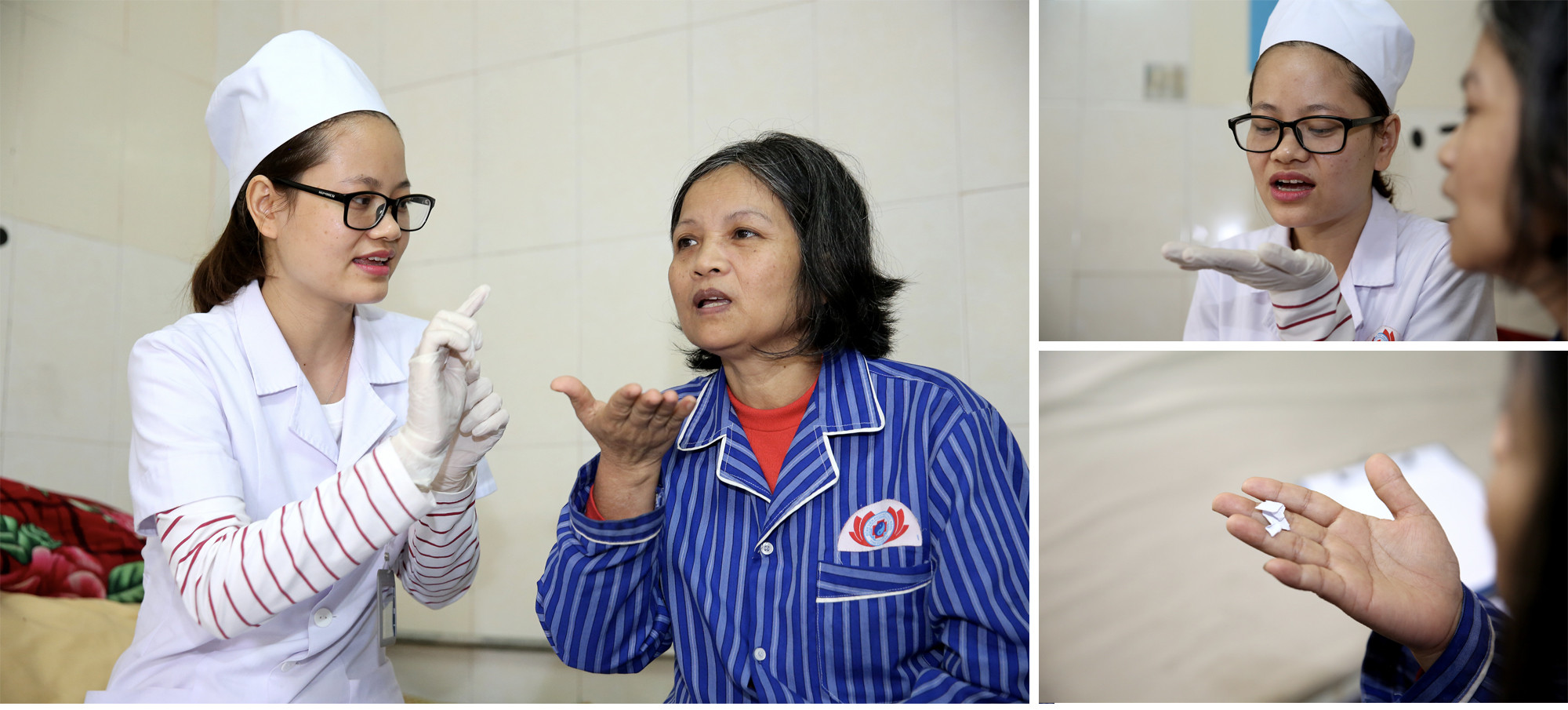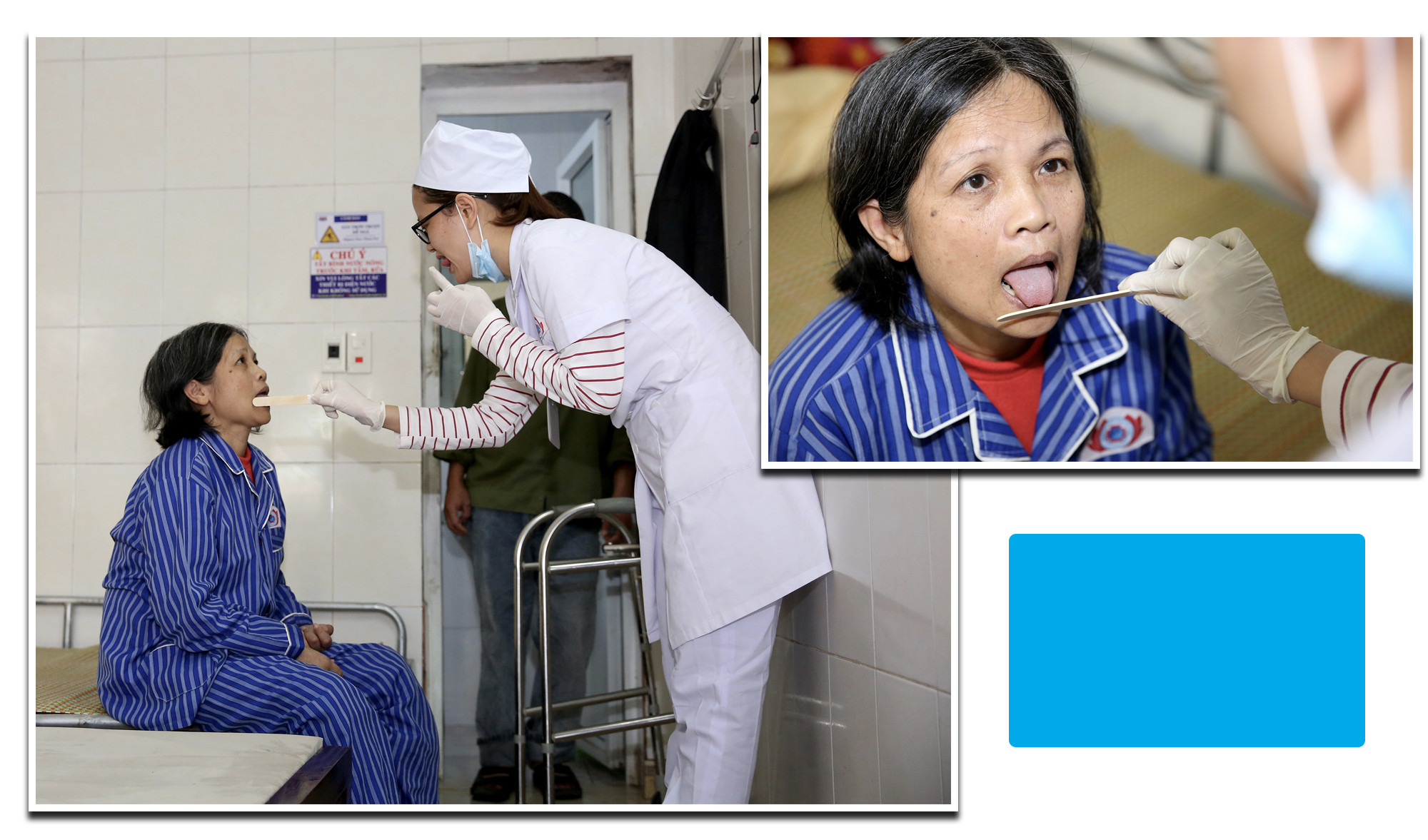Rehabilitation of language disorders due to stroke at Nghe An Rehabilitation Hospital
(Baonghean) - In order to restore language disorders caused by stroke, for children with speech delay... recently, Nghe An Rehabilitation Hospital has established a "Speech Therapy" unit and sent 4 people to study "Speech Therapy" and "Audiology Therapy", including 1 doctor (Tang Thi Nga) and 3 bachelors of Physical Therapy - Rehabilitation technicians.
Reason
Master Thai Thi Xuan - Director of Nghe An Rehabilitation Hospital said: Language loss is expressed in speech as distortion, which is a phenomenon such as losing the final vowel when pronouncing. Some people after a stroke become babbling like a child learning to speak. There are cases where the rhythm of speech is lost, the voice changes, the tone of the language is changed, some people speak with accents like foreigners. Stuttering and speaking incorrectly also appear in some cases. Aphasia also often occurs in these patients, the patient cannot or has difficulty calling out the exact name of the object, even though they really want to describe it.
In some cases, the doctor must understand what the patient wants to say, then say the first sound of a word to help them continue. Some people with dysarthria use words that do not match the things they are called. There is no connection between the correct word and the word the patient utters, and the word often lacks meaning.
 |
| Treatment of language disorders in stroke patients. |
It has been found that prolonged migraines can also lead to this consequence. Open or closed head injuries in war or in daily life (traffic accidents, industrial accidents) are also a common cause of aphasia. Brain tumors can also cause aphasia and may be a typical symptom of a left temporal lobe tumor. Infections causing abscesses or dissemination (encephalitis) can cause this condition. Language disorders can be a symptom of a focal seizure.
Consequences of language loss
Recently, Nghe An Rehabilitation Hospital has received many patients for treatment and language rehabilitation due to stroke, children with speech delay, etc. Patient Nguyen Thi Thu Ha (54 years old) from Nghia Xuan commune (Quy Hop) is one of the cases of stroke leading to speech delay.
Mr. Truong Van Tung (husband of patient Nguyen Thi Thu Ha) said: "My wife had a stroke 3 years ago. After rehabilitation treatment, she can now move her limbs, but she still cannot walk on her own and needs assistance." The biggest difficulty for Ms. Ha is her slurred speech. After careful research, the family took Ms. Ha to Nghe An Rehabilitation Hospital for "speech therapy" combined with rehabilitation of mobility.
 |
Talking with Dr. Tang Thi Nga - the first doctor of the Hospital to be sent to attend the joint training course on "Speech Therapy" and Audiology at Hue University of Medicine and Pharmacy in collaboration with Chonbuk National University, Korea, said: "The major "Speech Therapy" aims to treat the main diseases: Speech disorders (unclear speech, children with hearing loss, children with cerebral palsy, children with cleft lip and palate, voice disorders in Parkinson's disease, dysarthria, stuttering...); language disorders: children with delayed language development, hearing loss, children with autism spectrum disorder; communication disorders: loss of language after stroke or traumatic brain injury, dementia, autism spectrum disorder; swallowing disorders. The purpose of treatment is to improve speech and language in daily communication so that patients are more confident in communication. The treatment time is often long, so it requires perseverance from patients and their families."
 |
Restoring speech function for patients is a difficult and long-term problem, requiring the cooperation of doctors from neurology, ENT, and rehabilitation. Progressive lesions such as brain tumors are very difficult to recover. If it is aphasia, the reduction in language quality due to cerebral hemorrhage has a better progression than the cause of cerebral infarction. In cerebral infarction, this disease is generally caused by arterial blockage, but has a better prognosis than that caused by thrombosis. If aphasia occurs before the age of 10, the ability to recover is usually good; the older the person, the less responsive to recovery.
In general, intelligence and learning performance in all cases are reduced after suffering from this disease.
When detecting a patient with a voice disorder or loss of voice, at first let the patient try their best to speak naturally, then prompt them to talk about the issues closest to them such as family, work, then ask them to speak according to the doctor's requests to assess the patient's level of language disorder. Doctors and speech therapists set up attractive audiovisual aids and produce words and sentences. This is a rehabilitation method that requires not only good skills but also good psychological contact from the doctor.
 |
| Patient Nguyen Thi Thu Ha (Quy Hop) is being treated for language disorder by doctor Tang Thi Nga at Nghe An Rehabilitation Hospital. |
Among the risk factors for atherosclerosis, hypertension plays a more important role. The higher the blood pressure, the greater the risk. Antiplatelet drugs prevent atherothrombotic events including transient ischemic attacks and strokes. Aspirin and clopidogrel are widely used antiplatelet drugs.
The risk can be reduced by preventing the formation of atherosclerotic plaques in the cerebral arteries with a low-fat diet, rich in vitamins and fiber, avoiding being overweight or obese, not using stimulants such as alcohol, beer, cigarettes and needing to be physically active.
With the spirit: "All for patient satisfaction".
Is "Where patients place their trust".
The first “Green - Clean - Beautiful” Hospital - Hotel model in Nghe An.
Address: No. 220, Binh Minh Street, Cua Lo Town, Nghe An.
Clinic Phone: 02383.922.922
24/7 hotline: 02383.922.922
Hotline: 0966.251.414; 0912.002.210
Director's phone number: 0912.487.568.
